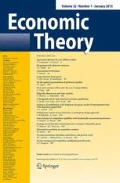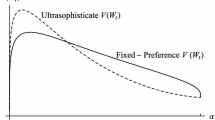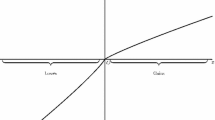Abstract
Inadequate saving for retirement and excessive consumption of sin goods have both been attributed to present bias. However, demonstrations that present bias does produce these effects have typically been confined to special cases. Previous research has focused on specific forms of discounting (such as quasi-hyperbolic) and on infinite planning horizons. Our paper investigates the implications of general present bias for consumption rules in a setting with an arbitrary number of periods. We show that equilibrium rules need not always prescribe higher consumption than precommitment decision rules do for the same stock. However, there are still social gains to discouraging consumption, and so rationales for commitment devices and paternalist interventions do generalize.
Similar content being viewed by others
References
Allcott, H., Mullainathan, S., Taubinsky, D.: Energy policy with externalities and internalities. J. Public Econ. 112, 72–88 (2014)
Allcott, H., Lockwood, B., Taubinsky, D.: Regressive sin taxes, with an application to the optimal soda tax. Quart. J. Econ. 134(3), 1557–1626 (2019)
Andersen, T.M., Bhattacharya, J.: Why mandate young borrowers to contribute to their retirement accounts? Econ. Theor. 71, 115–149 (2021)
Barro, R.: Ramsey meets Laibson in the neoclassical growth model. Quart. J. Econ. 114(4), 1125–1152 (1999)
Benhabib, J., Bisin, A., Schotter, A.: Present-bias, quasi-hyperbolic discounting, and fixed costs. Games Econ. Behav. 69(2), 205–223 (2010)
Caliendo, F.N., Findley, T.S.: Discount functions and self-control problems. Econ. Lett. 122(3), 416–419 (2014)
Caliendo, F.N., Findley, T.S.: Commitment and welfare. J. Econ. Behav. Organ. 159, 210–234 (2019)
Diamond, P., Kőszegi, B.: Quasi-hyperbolic discounting and retirement. J. Public Econ. 87, 1839–1872 (2003)
Feigenbaum, J.: Equivalent representations of non-exponential discounting models. J. Math. Econ. 66, 58–71 (2016)
Futagami, K., Nakabo, Y.: Capital accumulation game with quasi-geometric discounting and consumption externalities. Econ. Theor. 71, 251–281 (2021)
Gruber, J., Kőszegi, B.: Is addiction rational? theory and evidence. Quart. J. Econ. 116(4), 1261–1303 (2001)
Harris, C., Laibson, D.: Instantaneous gratification. Q. J. Econ. 128(1), 205–248 (2012)
Heidhues, P., Kőszegi, B.: Exploiting naivete about self-control in the credit market. Am. Econ. Rev. 100, 2279–2303 (2010)
Herings, P.J.J., Rohde, K.I.: Time-inconsistent preferences in a general equilibrium model. Econ. Theor. 29(3), 591–619 (2006)
Ida, T.: A quasi-hyperbolic discounting approach to smoking behavior. Health Econ. Rev. 4(1), 5 (2014)
Ikeda, S., Kang, M.: Hyperbolic discounting, borrowing aversion and debt holding. Jpn. Econ. Rev. 66(4), 421–446 (2015)
Kan, K.: Cigarette smoking and self-control. J. Health Econ. 26(1), 61–81 (2007)
Kocherlakota, N.: Looking for evidence of time-inconsistent preferences in asset market data. Fed. Reserve Bank Minneap. Q. Rev. 25(3), 13–24 (2001)
Kuchler, T., Pagel, M.: Sticking to your plan: the role of present bias for credit card paydown. J. Financ. Econ. 139(2), 359–388 (2021)
Laibson, D.: Hyperbolic discount functions, undersaving, and savings policy. Working Paper 5635, National Bureau of Economic Research (1996)
Laibson, D.: Golden eggs and hyperbolic discounting. Q. J. Econ. 112, 443–477 (1997)
Liu, L., Niu, Y., Wang, Y., Yang, J.: Optimal consumption with time-inconsistent preferences. Econ. Theor. 70(3), 785–815 (2020)
Loewenstein, G., Prelec, D.: Anomalies in intertemporal choice: Evidence and interpretation. Quart. J. Econ. 107(2), 573–597 (1992)
Meier, S., Sprenger, C.: Present-biased preferences and credit card borrowing. Am. Econ. J. Appl. Econ. 2(1), 193–210 (2010)
O’Donoghue, T., Rabin, M.: Doing it now or later. Am. Econ. Rev. 1999, 103–124 (1999)
O’Donoghue, T., Rabin, M.: Studying optimal paternalism, illustrated by a model of sin taxes. Am. Econ. Rev. 93(2), 186–191 (2003)
O’Donoghue, T., Rabin, M.: Optimal sin taxes. J. Public Econ. 90(10–11), 1825–1849 (2006)
Paserman, M.: Job search and hyperbolic discounting: structural estimation and policy evaluation. Econ. J. 118(531), 1418–1452 (2008)
Salanié, F., Treich, N.: Over-savings and hyperbolic discounting. Eur. Econ. Rev. 50(6), 1557–1570 (2006)
Zhang, L.: Saving and retirement behavior under quasi-hyperbolic discounting. J. Econ. 109(1), 57–71 (2013)
Author information
Authors and Affiliations
Corresponding author
Additional information
Publisher's Note
Springer Nature remains neutral with regard to jurisdictional claims in published maps and institutional affiliations.
Rights and permissions
About this article
Cite this article
Calcott, P., Petkov, V. Excessive consumption and present bias. Econ Theory 74, 113–134 (2022). https://doi.org/10.1007/s00199-021-01356-7
Received:
Accepted:
Published:
Issue Date:
DOI: https://doi.org/10.1007/s00199-021-01356-7




